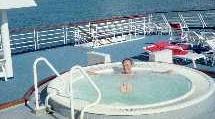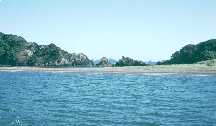A Jacuzzi in the Pacific. |

There is something unrealistic about sitting in a jacuzzi in the middle of
the Pacific. Below me turquoise pools of foam and water recede behind us as the
Marco Polo, our cruise ship, ploughs through the waves. We are surrounded by
water as far as the eye can see and have been so for several days. The man in
the next jacuzzi is sipping a vodka martini. In my view it is not a good idea to
drink in these situations. All the bubbles coming up through the water are
making it splash, and assuredly some of the splashes must be finding their way
into his drink. If he were at home he would not consider supplementing his drink
with bath water, even though he would have just changed it. Mind you there is a
precedent. I have noticed that blackbirds regularly bathe in their drinking
water.
It is remarkable how science and engineering have made life so easy for us.
Here we are living in the lap of luxury separated only by sheets of metal from
the turmoil beneath the surface of the waves as a shark devours another meal and
a hundred fish dart hither and thither in their endless quest for food.
More than one thousand years ago the Polynesian natives had man-handled
their canoes over the vastness of this ocean and navigated their way to the
islands of Tonga, Fiji and many others. How many had perished in the act. What
made them strike out into the unknown in the hope of finding land with only the
stars and a westerly wind to guide them? Not for them the sophisticated radar,
compass and satellite navigation systems with radio contact if the slightest
mishap should occur. Only nineteen companions, fellow strivers at the paddle as
their canoe mounted another wave.
Our floating palace is powered by 23,000 horse power twin diesel engines
devouring 60 tons of fuel per day. This nerve centre of the ship occupies three
decks and is laid out like the power station that it is. These are not the
cramped conditions seen under the car bonnet as you try to wriggle a spanner
into an impossible position. In here there is room to seat a symphony orchestra
between the engines. Not that you would hear much of them of course, except
maybe the trumpet.
On the bottom of the three decks is the control room with banks of dials to
monitor this nerve centre on which life and frozen food depend. Failure of this
vast technology would mean we would be at the mercy of the elements again,
though not quite in the manner of the polynesian explorers. There would still be
cover from the burning sun, albeit without airconditioning, and the waves would
not lap over the deck and swamp our food.
We are not all as lazy as this life style pretends. On the deck below me is
the gymnasium with an assorted range of equipment including monitors to check
how hard we are working. The walking machines are quite popular, especially
since the gymnasium is airconditioned. There is a regular clientele competing
for its services before breakfast. It can be set for running if the user is so
motivated but I notice that a brisk walking pace is more popular. To make it
more difficult, the slope of the machine can be altered so that one is climbing
up an interminable hill.
I have been impressed by the determination of an American lady who strides
purposefully uphill every morning as though she were out to conquer a mountain
before breakfast. In my view the gymnasium should be more popular than it is, as
retribution for all the food that is being eaten. The aerobic classes, however,
are full with people paying their penance for the six course meals. It would be
better for us if we were like the polynesian oarsmen who would work up a healthy
appetite ready for the next meal and take their food as a reward for an honest
day of toil. On here the food comes first and the exercise second, if at all. In
fact the next meal is likely to come before we have properly digested the last
one.
|

Of course it is not all plain sailing and pleasure. We have lectures to
attend when we will be educated on the anthropology and customs of the people on
the islands we are to visit. We also have to work at our pleasure. There are
many more diversions on board than our predecessors had on their craft. In the
lounge, the ladies are viewing a hat parade. Forty hats were arranged on
pedestals for their inspection and now, after tea to the accompaniment of the
Cafe Concerto Strings, models are showing them off to an appreciative audience.
Further along in the casino people are working hard at beating the odds at
Black Jack and the Roulette wheel. Elsewhere on the ship is the grandmother's
sherry party, an occasion to bring out the photographs and boast of their
children's offspring. There is a grandfathers' party also, but the rumour is
that they are served beer and the conversation is about other things.
No doubt the ancient polynesians had grandparent parties but not, to be
sure, on their sailing craft. Such occasions would await their arrival at a
habitable island. Their parties would have been well lubricated by the
traditional Kava drink. This muddy looking liquid made from ginger like roots is
popular in these parts. It is said to be a mild narcotic that makes the lips and
tongue go numb. Whether the numbness stifled the chatter at their gatherings is
not recorded, but it is claimed to put the drinkers in a party mood. We have not
experienced this euphoria, probably because we have been given a weaker mixture,
or less of it.
The Polynesians had some advantages when travelling by canoe. The canoe
could be driven up the beach so that it was easy to step off onto the sand with
barely a shrug of the shoulders. When we visit an island we have to anchor out
in the bay and transfer to a tender which takes us ashore. Then when we arrive
at terra firma we expect there to be a floating jetty to step onto so as not to
get our feet wet, or at least not until we have taken our shoes off. Not for us
the virgin sand where no man has set foot before.
For all the remoteness of the islands we have visited there has been a
western style loo inside a platted bamboo hut, and our barbecued meals have been
served with a full set of cutlery and a napkin. This is not the place for those
people who hanker after fresh fish caught over the stern of the boat and then
burnt black on a smoky fire.
But speaking of firma, how did our forbears cope with seasickness. There
would be no convenient tablet provided by Doctor Grant to be taken once every 12
hours, nor would there have been a comfortable cabin in which to lie down, with
hot and cold running water, or other facilities. Perhaps the float on the
outrigged canoe provided a sickbay for the afflicted and sleeping quarters for
the exhausted. We can be sure that they needed their sleep, for their voyages
lasted many weeks or months. We do not know, records have not been kept of these
details.
Of course in this tropical climate there is neither the need for hot water
nor a cover on the bed. Instead of the shower there might have been one of these
attractive Polynesian maidens scooping up tepid seawater with an empty coconut
shell ready douse the oarsmen. We have never been told of the social makeup of
these craft and have been led to believe that they were commanded solely by
native warriors. They were not assured of the friendly welcome that we have
received, when they visited new islands. In those days the meals, which arrived
by boat, were not frozen beef and horseradish source; but a distinctly more
human variety.
I have to say that I derive a certain comfort from knowing that the captain
is following a well-navigated route. I also feel assured in the knowledge that
it is important that our ship be at its destination in time to take on the next
assignment of passengers. It would be different if I were a Polynesian warrior.
I would have undergone the pain of extensive tattooing which is a mark of
bravery in these parts and which would have commanded the respect of my
colleagues in bygone days. In those circumstances minor difficulties, like
finding land in the next few weeks, would have been subjugated to the greater
glory of finding land at all.
|
|
|
River boat.
The Kava ceremony in Melanesian meeting house.
Houses in Melanesian village.
North Cape, NZ
Ship. | |
|
|



